初中英语单元语法精讲精练
人教版八年级上册英语Unit 3知识点梳理及语法讲义(教师版)

八年级上册英语Unit 3知识点与语法精讲精练词汇梳理(一)完成单词梳理:名词:1. competition比赛;竞赛 2. mirror 镜子 3. kid 小孩;年轻人4. grade 成绩等级5. hand 手6. saying 谚语;格言7. heart 内心;心脏8. fact 现实;事实9. information 信息;消息10. arm 手臂;上肢动词:1. win 获胜;赢 2. care 在意;关心 3. should 应该;应当4. reach 伸手;到达5. touch 感动;触摸6. break 损坏7. share 分享;共享;共用副词:1. loudly 喧闹地;大声地;响亮地 2. quietly 轻声地;轻柔地;安静地3. clearly 清楚地;清晰地;明白地4. truly 真正;确实形容词:1. outgoing 爱交际的;友好的;外向的 2. hard-working工作努力的;辛勤的3. fantastic 极好的;了不起的4. talented 有才能的;有才干的5. serious 严肃的;稳重的6. necessary 必需的;必要的7. loud 响亮的;大声的8. similar 相像的;类似的9. primary 最初的;最早的兼类词:1. both (adj/pron)两个;两个都2. better (adj/adv)较好的(地);更好的(地)3. which (pron/adj)哪一个;哪一些4. though (adv)不过;可是;然而(conj)虽然;尽管;不过5. laugh (v)笑;发笑(n)笑声(二) 词汇变形小结:1. good/well (adj/adv. 好的) — better (比较级) — best (最高级)2. loud (adj. 大声的) — loudly (adv.喧闹地)3. quiet (adj. 安静的) — quietly (adv. 安静地)4. competition (n. 竞争;比赛) — compete (v. 竞争;比赛)5. clearly (adv. 清楚地;清晰地) — clear (adj. 清楚的;清晰的)6. win (v. 赢;获胜) — won (过去式) — winner (n. 获胜者)7. talented (adj. 有才能的) — talent (n. 才能;天赋)8. truly(adv. 真正;确实) — true (adj. 真正的) — truth (n. 真实;真相)9. care(v. 在意;关心) — careful (adj. 认真的;细心的)10. serious(adj. 严肃的;稳重的) — seriously (adv. 严重地;严肃地)11. say(v. 说) — saying (n. 谚语;格言)12. touch(v. 感动;触摸) — touching (adj. 令人感动的) — touched (adj. 感动的)13. break(v. 破坏) — broke (过去式)【练一练】用所给词的适当形式填空1.Class Six won (win) the basketball game but our class lost the game.2.My friend likes telling jokes. He often makes us laugh (laugh)happily.3.Be quiet (quietly)! I have something important to tell you.4.I think Linda dances better (well) than Kate.5.Students can’t speak loudly (loud) in the library.6.Although he is only two years old, he can speak clearly (clear).7.The teacher told us to find out some information (information)about our country and share it next week.8.I’m truly (true) sorry that things had to end like this.st night we saw a movie and it made us touched (touch).10.I don't think differences (different) are important in a friendship.(三) 短语攻关:care about关心;在意be talented in 在……有天赋both...and...……和……都play the drums 敲鼓the singing competition 歌唱比赛be similar to 与……相像的bring out 使显现the same as 和……相同be different from与……不同as long as 只要in fact 事实上primary school 小学get good grades 取得好成绩have fun doing sth 做某事很开心make sb do sth 让某人做某事want to do sth 想要做某事make friends 交朋友be like 像……一样知识点梳理1.Both Sam and Tom can play the drums, but Sam plays them better than Tom. 萨姆和汤姆都会敲鼓,但是萨姆比汤姆敲得好。
2020七年级英语下册 Unit 4 After-School Activities词句精讲精练 (新版)冀教版
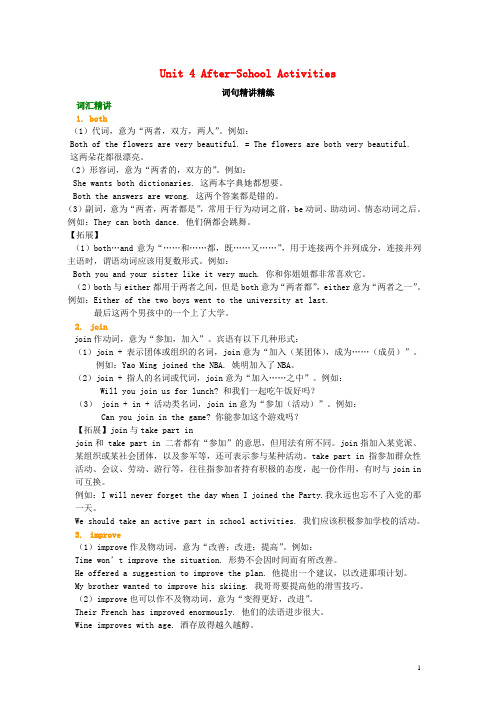
Unit 4 After-School Activities词句精讲精练词汇精讲1. both(1)代词,意为“两者,双方,两人”。
例如:Both of the flowers are very beautiful. = The flowers are both very beautiful.这两朵花都很漂亮。
(2)形容词,意为“两者的,双方的”。
例如:She wants both dictionaries. 这两本字典她都想要。
Both the answers are wrong. 这两个答案都是错的。
(3)副词,意为“两者,两者都是”,常用于行为动词之前,be动词、助动词、情态动词之后。
例如:They can both dance. 他们俩都会跳舞。
【拓展】(1)both…and意为“……和……都,既……又……”,用于连接两个并列成分,连接并列主语时,谓语动词应该用复数形式。
例如:Both you and your sister like it very much. 你和你姐姐都非常喜欢它。
(2)both与either都用于两者之间,但是both意为“两者都”,either意为“两者之一”。
例如:Either of the two boys went to the university at last.最后这两个男孩中的一个上了大学。
2.joinjoin作动词,意为“参加,加入”。
宾语有以下几种形式:(1)join + 表示团体或组织的名词,join意为“加入(某团体),成为……(成员)”。
例如:Yao Ming joined the NBA. 姚明加入了NBA。
(2)join + 指人的名词或代词,join意为“加入……之中”。
例如:Will you join us for lunch? 和我们一起吃午饭好吗?(3) join + in + 活动类名词,join in意为“参加(活动)”。
七年级英语下册Unit7TheBirthdayParty句式精讲精练 仁爱版
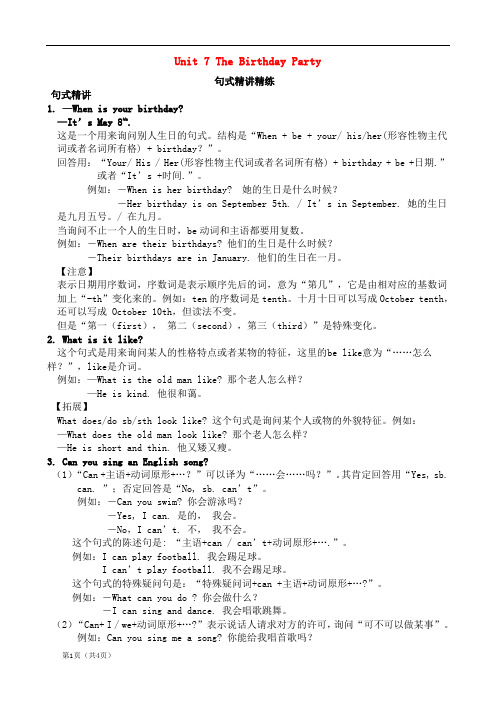
Unit 7 The Birthday Party句式精讲精练句式精讲1. —When is your birthday?—It’s May 8th.这是一个用来询问别人生日的句式。
结构是“When + be + your/ his/her(形容性物主代词或者名词所有格) + birthday?”。
回答用:“Your/ His / Her(形容性物主代词或者名词所有格) + birthday + be +日期.”或者“It’s +时间.”。
例如:-When is her birthday? 她的生日是什么时候?-Her birthday is on September 5th. / It’s in September. 她的生日是九月五号。
/ 在九月。
当询问不止一个人的生日时,be动词和主语都要用复数。
例如:-When are their birthdays? 他们的生日是什么时候?-Their birthdays are in January. 他们的生日在一月。
【注意】表示日期用序数词,序数词是表示顺序先后的词,意为“第几”,它是由相对应的基数词加上“-th”变化来的。
例如:ten的序数词是tenth。
十月十日可以写成October tenth,还可以写成 October 10th,但读法不变。
但是“第一(first),第二(second),第三(third)”是特殊变化。
2. What is it like?这个句式是用来询问某人的性格特点或者某物的特征,这里的be like意为“……怎么样?”,like是介词。
例如:—What is the old man like? 那个老人怎么样?—He is kind. 他很和蔼。
【拓展】What does/do sb/sth look like? 这个句式是询问某个人或物的外貌特征。
例如:—What does the old man look like? 那个老人怎么样?—He is short and thin. 他又矮又瘦。
人教版七年级下册英语《Unit2Whattimedoyougotoschool》词句精讲精练
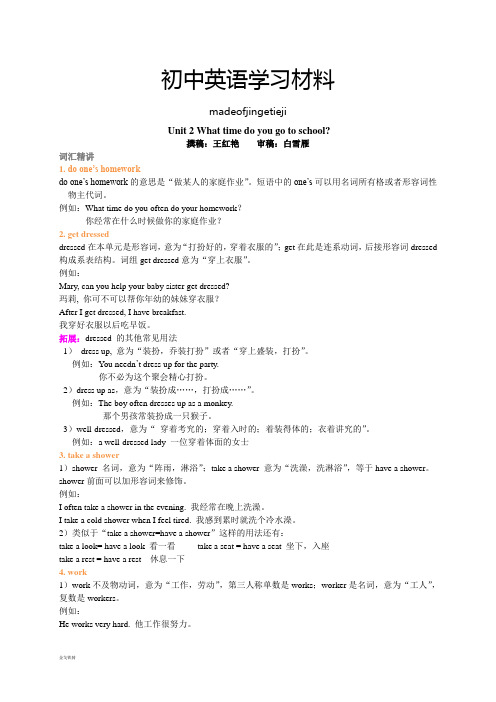
初中英语学习材料madeofjingetiejiUnit 2 What time do you go to school?撰稿:王红艳审稿:白雪雁词汇精讲1. do one’s homeworkdo one’s homework的意思是“做某人的家庭作业”。
短语中的one’s可以用名词所有格或者形容词性物主代词。
例如:What time do you often do your homework?你经常在什么时候做你的家庭作业?2. get dresseddressed在本单元是形容词,意为“打扮好的,穿着衣服的”;get在此是连系动词,后接形容词dressed 构成系表结构。
词组get dressed意为“穿上衣服”。
例如:Mary, can you help your baby sister get dressed?玛莉, 你可不可以帮你年幼的妹妹穿衣服?After I get dressed, I have breakfast.我穿好衣服以后吃早饭。
拓展:dressed 的其他常见用法1)dress up, 意为“装扮,乔装打扮”或者“穿上盛装,打扮”。
例如:You needn’t dress up for the party.你不必为这个聚会精心打扮。
2)dress up as,意为“装扮成……,打扮成……”。
例如:The boy often dresses up as a monkey.那个男孩常装扮成一只猴子。
3)well-dressed,意为“穿着考究的;穿着入时的;着装得体的;衣着讲究的”。
例如:a well-dressed lady 一位穿着体面的女士3. take a shower1)shower 名词,意为“阵雨,淋浴”;take a shower 意为“洗澡,洗淋浴”,等于have a shower。
shower前面可以加形容词来修饰。
例如:I often take a shower in the evening. 我经常在晚上洗澡。
人教版初中英语初一上册Unit4 知识点总结与练习
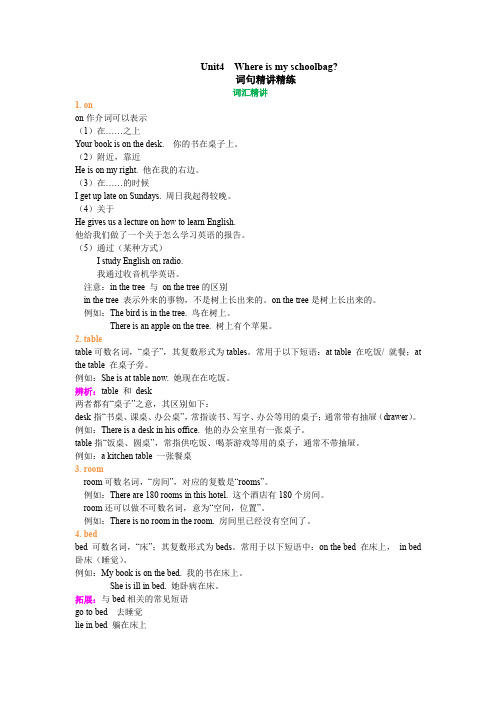
Unit4 Where is my schoolbag?词句精讲精练词汇精讲1. onon作介词可以表示(1)在……之上Your book is on the desk. 你的书在桌子上。
(2)附近,靠近He is on my right. 他在我的右边。
(3)在……的时候I get up late on Sundays. 周日我起得较晚。
(4)关于He gives us a lecture on how to learn English.他给我们做了一个关于怎么学习英语的报告。
(5)通过(某种方式)I study English on radio.我通过收音机学英语。
注意:in the tree 与on the tree的区别in the tree 表示外来的事物,不是树上长出来的。
on the tree是树上长出来的。
例如:The bird is in the tree. 鸟在树上。
There is an apple on the tree. 树上有个苹果。
2. tabletable可数名词,“桌子”,其复数形式为tables。
常用于以下短语:at table 在吃饭/ 就餐;at the table 在桌子旁。
例如:She is at table now. 她现在在吃饭。
辨析:table 和desk两者都有“桌子”之意,其区别如下:desk指“书桌、课桌、办公桌”,常指读书、写字、办公等用的桌子;通常带有抽屉(drawer)。
例如:There is a desk in his office. 他的办公室里有一张桌子。
table指“饭桌、圆桌”,常指供吃饭、喝茶游戏等用的桌子,通常不带抽屉。
例如:a kitchen table 一张餐桌3. roomroom可数名词,“房间”,对应的复数是“rooms”。
例如:There are 180 rooms in this hotel. 这个酒店有180个房间。
语法专题十二 简单句【考点精讲精练】-2023年中考语法一点通(学生版)(1)

语法专题十二、简单句考点精讲英语句子以谓语动词为中心,前面是动作的执行者主语(被动语态除外)后面是动作的承受者。
简单句指的是只含有一个谓语的句子;含有两个及以上谓语的就是复合句(后面专题待续)。
1.英语的句子成分组成句子的各个部分叫句子成分。
英语的基本成分包括主语、谓语、宾语、表语、定语、状语、补语等。
主语(S ubject)是句子的主题,是说明的对象。
一般为名词(短语)、代词、数词、动名词(短语)、不定式(短语)或从句;置于句首。
谓语(V erb动词),用于说明或描述主语的行为动作或状态。
由动词或动词短语充当;在句子中位于主语之后。
宾语(O bject)表示动作支配的对象,有单宾语、双宾语之分;双宾语又分为直接宾语和间接宾语。
宾语可以由名词(短语)、代词、数词、不定式(短语)、动名词(短语)、从句等充当;一般位于及物动词(短语)和介词后面。
表语(P redicative)说明主语的身份、特征或状态。
可以由名词、代词、形容词、数词、副词、介词短语、不定式(短语)、动名词(短语)等充当;在句中位于系动词之后。
定语(attribute)是用于修饰名词或代词的词、短语或从句,可分为前置定语和后置定语。
一般由形容词、名词、形容词性物主代词、数词、分词、介词短语、不定式(短语)、从句等充当。
状语(adverbial)用于修饰动词、形容词、副词或整个句子,说明动作或状态特征。
可以表示时间、地点、原因、目的、结果、方式、伴随、条件、让步等;其位置非常灵活。
补语(C omplement)用于补充说明主语或宾语的,最常用的是宾语补足语。
宾语补足语可由名词(短语)、形容词、副词、动词不定式(短语)、介词(短语)等充当。
2.英语简单句的六种基本句型①主语+系动词+表语S十V十P主系表结构➢English is very easy. 英语很容易。
(be动词)➢It smells delicious. 它闻起来好香。
(感官动词,smell, taste, look, sound, feel)➢The food has gone bad.食物已经变质了。
北师大版初中英语九年级下册Unit 9 Save the Planet 句式精讲
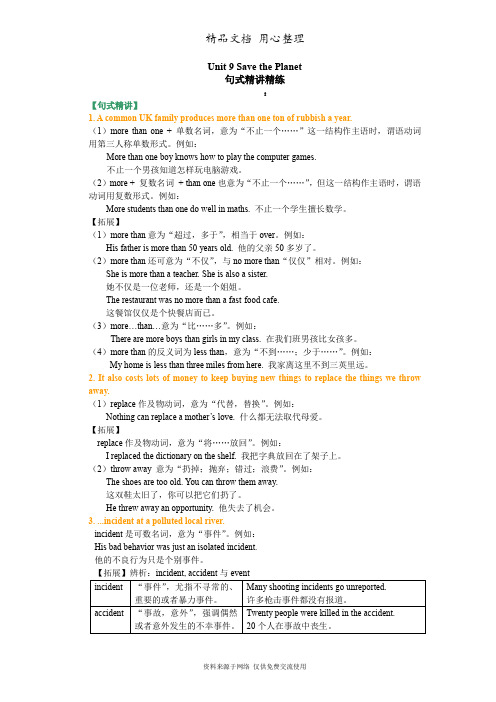
Unit 9 Save the Planet句式精讲精练:【句式精讲】1. A common UK family produces more than one ton of rubbish a year.(1)more than one + 单数名词,意为“不止一个……”这一结构作主语时,谓语动词用第三人称单数形式。
例如:More than one boy knows how to play the computer games.不止一个男孩知道怎样玩电脑游戏。
(2)more + 复数名词+ than one也意为“不止一个……”,但这一结构作主语时,谓语动词用复数形式。
例如:More students than one do well in maths. 不止一个学生擅长数学。
【拓展】(1)more than意为“超过,多于”,相当于over。
例如:His father is more than 50 years old. 他的父亲50多岁了。
(2)more than还可意为“不仅”,与no more than“仅仅”相对。
例如:She is more than a teacher. She is also a sister.她不仅是一位老师,还是一个姐姐。
The restaurant was no more than a fast-food cafe.这餐馆仅仅是个快餐店而已。
(3)more…than…意为“比……多”。
例如:There are more boys than girls in my class. 在我们班男孩比女孩多。
(4)more than的反义词为less than,意为“不到……;少于……”。
例如:My home is less than three miles from here. 我家离这里不到三英里远。
2. It also costs lots of money to keep buying new things to replace the things we throw away.(1)replace作及物动词,意为“代替,替换”。
专题02 名词(可数与不可数、所有格、主谓一致)-初中英语重要语法精讲精练(江苏专用)

专题02 名词(可数与不可数、所有格、主谓一致)名词的考查方向:1.可数和不可数2.名词所有格3.名词词义辨析4.主谓一致名词在中考中的主要考查点及考查形式:考查要点考查形式1.可数名词的单复数;2.不可数名词的量;3.名词的所有格;4.名词的句法作用; 5,名词的词义辨析;6.名词与主谓一致。
1.单项选择;2.词形转换;3.词语辨析;4.翻译句子;5.单词拼写。
一)、名词单复数名词的数名词的数主要指普通名词的数。
我们又将普通名词分为可数名词和不可数名词,不可数名词没有复数变化,可数名词有单数和复数之分。
1)可数名词的单数可数名词的单数形式前面一般加冠词a或an,表示“一”的概念。
构成例词特别提示以辅音音素开头的名词前加a a book 一本书a computer 一台电脑a university 一所大学有时可以在名词前加one,each, every, another 表示“一”的概念。
如:each book 每一本书;every day 每一天以元音音素开头的名词前加an an apple 一个苹果an hour 一个小时an idea 一个想法批注:单数名词前面加a 还是an,主要是看单词的第一个字母的发音,而不是看构成单词的第一个字母。
2)可数名词的复数情况构成方法例词读音一般情况在词尾加-s desk→desksmap→maps-s 在清辅音后发/s/day→daysgirl→girls-s 在元音和浊辅音后发/z/以s,x,ch,sh结尾的词在词尾加-es bus→busesbox→boxeswatch→watchesdish→dishes-es 发/iz/ 音以辅音字母加-y结尾的词变y为i再加-esfamily→familiesfactory→factoriesparty→parties-ies 发/iz/音以元音字母加-y结尾的词在词尾加-sday→daysboy→boyskey→keys-s 发/z/ 音以f或fe结尾的词多为将-f或-fe改变为-ves knife→knives;life→lives;leaf→leaves;scarf(围巾)→scarves口诀:树叶半数自己黄,妻子拿刀去杀牛;架后窜出一只狼,就-ves发/vz/音像小偷逃命忙。
02 宾语从句-中考英语总复习 重点语法精讲精练(全国通用)
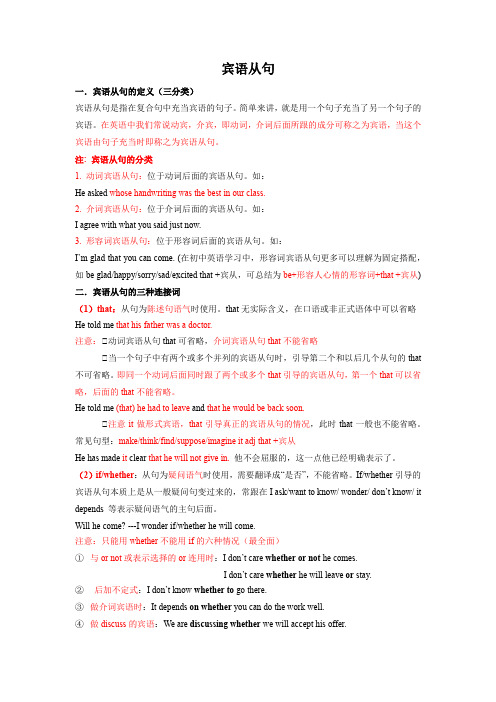
宾语从句一.宾语从句的定义(三分类)宾语从句是指在复合句中充当宾语的句子。
简单来讲,就是用一个句子充当了另一个句子的宾语。
在英语中我们常说动宾,介宾,即动词,介词后面所跟的成分可称之为宾语,当这个宾语由句子充当时即称之为宾语从句。
注: 宾语从句的分类1. 动词宾语从句:位于动词后面的宾语从句。
如:He asked whose handwriting was the best in our class.2. 介词宾语从句:位于介词后面的宾语从句。
如:I agree with what you said just now.3. 形容词宾语从句:位于形容词后面的宾语从句。
如:I’m glad that you can come. (在初中英语学习中,形容词宾语从句更多可以理解为固定搭配,如be glad/happy/sorry/sad/excited that +宾从,可总结为be+形容人心情的形容词+that +宾从)二.宾语从句的三种连接词(1)that:从句为陈述句语气时使用。
that无实际含义,在口语或非正式语体中可以省略He told me that his father was a doctor.注意:①动词宾语从句that可省略,介词宾语从句that不能省略①当一个句子中有两个或多个并列的宾语从句时,引导第二个和以后几个从句的that 不可省略。
即同一个动词后面同时跟了两个或多个that引导的宾语从句,第一个that可以省略,后面的that不能省略。
He told me (that) he had to leave and that he would be back soon.①注意it做形式宾语,that引导真正的宾语从句的情况,此时that一般也不能省略。
常见句型:make/think/find/suppose/imagine it adj that +宾从He has made it clear that he will not give in. 他不会屈服的,这一点他已经明确表示了。
Unit 6 (精讲课件)-八年级英语上册单元语法精讲精练(人教版)

be going to 的用法
3. be going to的否定形式可用于表示不愿意或拒绝。若主 语是you, 则表示不可以或禁止。
You’re not going to bring your pet dog here. 你不准带宠物。 I‘m not going to attend the party.我不愿意参加聚会 We aren‘t going to go swimming tomorrow. 我们明天不想去游泳。 You are not going to marry her. 你不准和她结婚。
句及其肯 形+其他?
basketball?
句型转换
肯定句 主语+be going to +动词原 I am going to play basketball. 形+其他.
否定句 主语+be not going to+动 I am not going to play basketball. 词原形+其他.
一般疑问 Be+主语+ going to+动词原 —Are you going to play
八年级上册
人教版初中英语语法
Unit 6 I’m going to study computer science.
人教版8年级上册(单元)
语法点
Unit 1 Where did you go on vacation? Unit 2 How often do you exercise? Unit 3 I’m more outgoing than my sister.
Unit 6 I’m going to study computer
CONTENTS science.
Unit 5 Fun Clubs (课件)-七年级英语上册单元语法精讲精练(人教版2024)

m2a.ke表th示e b天ed性整,理性床格铺”等,为不可数名词;偶尔用作可数名词,主要指种类。 mmHaakkeee iaaslsiguvigengngees谋trioo生uns提b建y n议ature. /He has a generous nature.
他生性慷慨。
n. 自然界;大自然
1. 表示自然,自然界等,是不可数名词。
mIaskne’at Nmaistuakree 犯wo错n误derful? 大千世界不奇妙吗?
make a decision 做决定
mNakaetpurroegriesssat取its得b进e展st in spring. 春天万物欣欣向荣。
accurately
副词,表示“精确地,准确地”,不仅表示精确,还 常常带有强调的语气,通常用于强调某事正是如 此或正是这样。 That is exactly what I meant. 那正是我所想的。
exactly = to be exact
副词,表示“精确地,准确地”,主要用于描述测 量或评估的精确性,侧重于具体的准确程度。 Can he measure accurately?他能计量准确吗?
make the bed 整理床铺
mspaokertaslniveinwg s谋体生育新闻 entertainment news娱乐新闻 m常a见ke习a s语ug和ges短tio语n 提建议
be good/bad news for sb./sth.:对某人或某事有利/不利。
break the news:最先(向某人)透露坏消息,说出实情
乐器
What’s your favorite musical instrument?
初中英语语法精讲精练

一、一般现在时1. We won’t go unless you_______ soon.A. comingB. cameC. will comeD. come2. Japan ________ to the east of China.A lieB lies C. lying D. lied3. The plane to Shanghai _________ at 8:30.A. leavesB. leavingC. will leaveD. leave二. 一般过去时4. It ______ Yang Liwei about 21hours _____ the earth 14times in his spaceship.A. spent; circlingB. took; traveling.C. spent; to travel.D. took; to circle.5. —Your phone number again? I _____ quite catch it. —it’s 69568442.A didn’t B. couldn’t C. don’t. D. can’t.6. He said he______ me a present unless I ________ in doing the experiment.A. had not given; had not succeededB. would not give; succeed.C. will not give; succeedD. would not give; will succeed.7. There _____ no bus stop here year.A. isB. was.C. areD. were8. She said that they_____ a good time.A .had B. has C. have D. will have9. Mike _____ until his father came back.A. went to bed.B. doesn’t go to bed.C. didn’t go to bedD. wouldn’t go to bed.10. My sister________ and _____ herself when she was riding her bike yesterday.A. falls… hurt.B. falls…hurts.C. has fallen… hurt.D. fell…hurt.11. He __________ with us yesterday morning.A. doesn’t go swimming.B. goes swimming.C. didn’t go s wimming.D. went to swimming12. _____ your parents in Shanghai last year?A. IsB. AreC. WasD. Were13. Tom ______ (match) TV at home last night. He _____ (go ) nowhere.14. When I ______ (be) young, I often ______ (play) football. 15. He _______ (be) not with me at that time.16. She ______(give) Mary a present last Christmas.17. It ______ (happen) an hour ago.18. They ________ (go ) to the par last Sunday.19. I __________ (have) a good time last holiday.20. Mrs. Li _______ (live) here many years ago.21. ____ he ____ (do) his homework yesterday? No, he _____(not finish) it.22. Father_______ (get) a letter from my sister last week.23. Who ________ (break) the window just now?24. It was very cold, so he ________ on his coat (put).25. The bed wasn’t good, I_____ very well. (sleep).26. Bob was very wasn’t interesting. They____ in very much. (enjoy)27. I went to Lily’s flat, but she ________ there (be).28. He was in a hurry, so she __________time to cook for you (have).三. 一般将来时.28. When we get our tickets, be marked “first class” ______.A. it is to.B. it will.C. they were to.D. they will.29. Look! The woman with curl hair over there _____ us a talk about DNA.A. is about to give.B. would give.C. was going to give.D. had given.30. She ______ me _______ at the airport this evening.A. is seeing; out.B. is seeing; off.C. sees; off.D. will see; out.31. She _____ to the cinema with her classmates tomorrow evening.A. went.B. would go.C. has gone.D. will go.32. There______ a basketball match in our school the day after tomorrow.A. will have.B. will be.C. is going to have.D. would be.33. They______ a new bridge over the river next year.A. have built.B. are going to build.C. are building.D. were going to build.34. We ______ to the Great Wall f it_____ tomorrow.A. don’t go; rains.B. won’t go; rains.C. are building.D. go; doesn’t rain.35. Either you or he_____ there tomorrow.A. go.B. goes.C. are going.D. is going.36. A present ______ to me by Mother next week.A. will give.B. is given.C. will be give.D. will be given.37. I won’t______ (be) free tomorrow.38. The students_____ (have) a meeting this weekend.39. Lily ______( stay) with me tonight.40. It’s going to _____(rain) this evening.41. We are going to ______ (visit) the Summer Palace next Monday.42. She is going to ______( help) Tim again on Sunday.43. Jim ______(see) a film tomorrow.44. We ______(visit) our teacher next Sunday.45. _______ you _______(need) me to help you?46. They ______(not go ) there if it snows tomorrow.47. There _______ (be) a meeting tomorrow morning.48. She_____ (come) here soon.四.过去将来时.49. They _______ the game when rain.A. were about to start.B. were about start.C. were to starting.D. was about to starting.50. He was 8. In two years he _____10.A. will goB. would goC. has goneD. goes51. The teacher said that she ______ us to the park the next day.A. will take.B. has taken.C. would take.D. is taking.52. Mr. Brown asked who ____ the message to Mr. Evans.A. was going to talkB. has takenC. could giveD. will tell53. —What did the scientist say?—He said he wondered if_____ into space by spaceship one day.A. he had to fly.B. he could fly.C. can he fly.D. could he fly.54. He said there_____ another new school near the soon.A was. B. had been. C. would be. D. was having.55. He told us that he_____(go) to London next month.56. She said there ______(be) a new play that evening. 57. Mrs. Lee hoped that her son_____(come) to see her very soon.58. We asked them what_____(happen) next.59. That woman bodyguard told when she ______( let) us in if we could show herthe passes.60. Tony wanted to know when she ______( visit) the exhibition again.五.现在进行时61. Dictionary __________ I have looked for it everywhere but still _________it.A. has lost; don’t find.B. is missing’ don’t find.C. has lost; haven’t found.D. is missing; haven’t found.62. My wife __________.A. has forever criticized me.B. forever criticizes me.C. does forever criticize me.D. is forever criticizing me.63. Look! Li Lei ______ Jim with his Chinese.A. is helping.B. has helpedC. is going to help.D. would help.64. Stay here boy Don’t go o ut It ______ now.A. will rain.B. is going to rain.C. has rained.D. is raining.65. The students of Class 3______ a football game now Let’s go and watch it.A. are having.B. will have.C. is having.D. will be had.66. Miss Gao _____ she’s w orking.A. isn’t sleeping.B. doesn’t sleepC. is sleepingD. sleeps.67. The child ____ on the same clothes?A. put on.B. putting onC. went.D. wearing.68. Are all the twins ______the same clothes?A. put on.B. putting on.C. wear.D. talls.69. The students____(read) English in the classroom now.70. “What are you doing here?” “I _____(wait) for Tom.”71. Those students ______ (work) in a factory these days.72. More and more American people______(give) up smoking.73. Ms Lee ____(come) to see us tomorrow And she ______ (leave) for Beijing theday after tomorrow.74. The Whites ______(go ) to the concert this coming Saturday.75. Look. A boy ______(write) on the wall.76. Listen The baby_______(cry).77. ______they _____ (do) their homework now?78. ——What ______he _______(play) now?——He_______ (play) basketball.79. Jenny ________(not watch) TV now.80. Don’t make any noise My father ______(sleep).六.过去进行时.81. ——I didn’t see you at the meeting yesterday, why?——I ____for a long distance call then from my from my daughter in Canada.82. Mary _____a dress when she cut her finger.A. made.B. is making.C. was making.D. makes.83. As she _____ the newspaper Granny ____ asleep.A. read; was falling.B. was reading; fell.C. was reading; was falling.D. read; fell.84. James has just arrived but I didn’t know he______ until yesterday.A. will come.B. was coming.C. had been coming. D, comes.85. When the teacher came in the students______A talkB are talkingC were talkingD will talk86. ——Were you writing a letter at 9 last night? ——No, I ______.A. were.B. was.C. wasn’tD. weren’t.87. Wang Lin and Hong ________ for us when we got to the school gate.A. is waiting.B. were waiting.C. are waiting.D. was waiting88. My mother ______ breakfast while I ______ face this morning.A. cooked; was washing.B. was cooking; was washing.C. was cooking; washed.D. would cook; was washing.89. Joan ______ Tom with his lessons at this time yesterday.A. was going to help.B. was helping.C. would help.D. has helped.90. When I went to Linda’s She____ in bed reading.A. is lying.B. has lain.C. is going to lie.D. was lying.91. He ______(do) his homework at two o’clock yesterday afternoon.92. They_____(have) a meeting from 8 to 10 last night. 93. Mary_____(watch) TV when we came in.94. I ______( wash) my clothes this time yesterday.95. At that time the boy______(play) football.96. While we______ (talk) with Mr. Wang in English, a foreigner came up.七现在完成时.96. —What a nice bike! How long ____ you _____ it? —Just two weeks.A. will; buy.B. did; buy.C. are; having.D. have; had.97. —Do you know our town at all? —No this is the first time I________ here.A. was.B. have been.C. came.D. am coming.98. ——Have you ______ been to our town before?——No, it’s the first time I _____ here.A. even; come.B. even; come.C. ever; come.D. ever; have come.99. ——May I go to play tennis with you, Dad?——_____ you _____ your composition yet?A. Are; finishing.B. Did; finish.C. Will; finish.D. Have; finished. 100. You don’t need to describe her I ________ her several times.A. had met.B. have met.C. met.D. meet.101. ——I’m sorry to keep you waiting.——Oh, not at all. I _____ here only a few minutes.A. have been.B. had been.C. was.D. will be.102. Mr. Li isn’t here. He ____ to England.A. has been.B. have been .C. has gone.D. have gone. 103. Mike ______ several places since he came to Beijing.A. will visit.B. has visited.C. is visiting.D. visited.104. ——_____your brother_____ a new watch? ——Not yet.A. Have; was.B. Did; buy.C. Has; bought.D. Will, buy. 105. He _____ here in 1980. He _____ a teacher for over twenty years.A. came; was.B. came; has been.C. has come; is.D. has come; has been. 106. Lucy _____ many friends since she went to Paris.A . made. B. is going to make C. has made. D. makes.107. She _____ the dictionary to Alice yet.A. has retun ed.B. hasn’t retuned.C. would returnD. returned.108. She said, “I’m sorry to hear that he_____ ill for two weeks.”A. has been.B. had been.C. was.D. will be. 109. ——Mum? May I go out and play basketball?——______ you _____ your homework yet?A. Do; do.B. Are; doing.C. Did; do.D. Have; done. 120. He ______(go) to see Ms Lee and he’ll be back in two hours.121. Great changes ______ (take) place in my hometown since 1996.122. Ms Black ______(teach) maths for 21years.123. He ______(be) to Paris five times.124. He joined the army then he was 18. He _____(be0 an army man many years. 125. I don’t want to see the film because I ______(see) it I saw it last Monday.126. He______(live) in Beijing since he was born.127. We_______ (not hear) from them for a long time.128. The Greens______ (be) to Shanghai twice.129. Where is your father? He _____(go) to England.130. How long____ you____ (learn) English?131. They _____(not see)for years.八.过去完成时.132. The students____ busily when Miss Brown went to get a book she _____ in the office.A. had written; left.B. writing; has left.C. had written; had left.D. were writing; had left.133. I had hoped _____ my letter.A. her to answer.B. that she answer.C. that she would answer.D. her answering.134. By the time school _____ over, the rain_____, so I didn’t use my raincoat.A. has been.B. had been.C. be.D. would be.135. The film _____ on for ten minutes when Jack got to the cinema.A. has been.B. had been.C. be.D. would be.135.——Did you _____ the concert last night?——V ery much I _____ to a concert for a long time.A. enjoy; haven’t gone.B. enjoy; haven’t been.C. enjoy; hadn’t gone.D. enjoyed; didn’t go.136. It_____ nice to see John yesterday I ____ him for a long time.A. was; haven’t seen.B. had been; haven’t seen.C. was; hadn’t seen.D. had been; hadn’t seen.137. Last right I ____ studying at 9:30 Bill came at 9”50 By the time ca me I _____ my homework.A. finished; finished.B. would finish; finished.C. had finished; had finished.D. finished; had finished.138. He told me he ____ (meet) her before.139. She thanked me for what I ____( do) for her son.140. I ____(learn) 300 English words by the end of last month.141. He____ (leave) his office when I arrived there.142.She ____ (visit) the city three times before she died in 1997.143. They knew she _____ (borrow) a lot of money for her daughter.144. We _____(give) some flowers for our teachers last Teacher’s Day.145. What ______you_____(do)`tomorrow?146. I ______(drink) a bottle of orange yesterday.147. He______ (go) to the zoo last Sunday.148. Look Tom______(draw) a picture.149.Kate______(write) a letter now.150. Listen who _____(sing) an English song?151. She_____(catch) the first bus every morning.152. They often _____(fly) kites in spring.153. He_____(be) an American boy He _____(come) from New York.154. He is in Beijing now He often_____(write)letters to his in English.155. Don’t make any noise Your father_____(work).156. We_____(know) each other since ten years ago.157. I heard that Jim ______(go) to England the next year.158. They_____(take) that old man to the hospital last Monday.159. It______(rain0 hard when I went home the day before yesterday.160. When we got to the cinema, the film____ already ___(begin).161. Who ____(teach) us English next term?162. 1 _____(not tell) him anything.163. ______ you ______(like) something to drink Mary?164 He_____(can come) earlier tomorrow morning.165. There ____(be) sure he______(find) a good job when he _____(return) to his home.166. I_____(be)sure he_____(find)a good job when he_____(return) to his home-town. 167. ——How many times _____ your sister _____(be) to the Summer Palace?——Twice She ____(go) there in 2003 and 2006168.I _____(be) sorry______(hear) that you ______(be) ill for two days,. If you ____(not feel) well tomorrow you _____(not go) to work..169. Look that boy_____ (make) faces.170. Tom draws best in his class _____he?171.One day a farmer______ (walk) in a mountain near his home when he_____(see) a ba-by bird.172. My mother said she ______(do) some waking if it ______( not rain) the next day. 173.Tom ____(go) to Shanghai already I think he_____-(write) to me as soon as he______(reach)there.174. I don’t know your friend Jack I _____never_____(meet)him.175. After he had read this book he _____(return)it to the library.176 .She always______(get0 on well with her classmates.177. Don’t worr y He______(catch) up with the other soon.178. The glass is broken It _______(break) by my brother.179. Students_____(have)ten minutes’ rest between classes.180. What_____ you______(do) when I called you yesterday evening?181. Look! The train ______ just_____(arrive).182. She_____ ______ (pick) apples in her garden when we went to see her yesterday. 183. Please be quick or you _____ (be) late for the meeting.184. I _____ (read) the book already How long____ you______(read) it?185. Could you tell me what time he____(come) tomorrow? Please let me know as b soon as he ____ (come) here tomorrow.186. There ____(be) great changes I our city since 1978.187. My son studies in CanadA I ______-(not hear) from him for a long time. 188. Thanks a lot It’s rainy a gain It_______(rain0 for a long time.189. Look! They ____(dig) potatoes in the fields.190.We_____(have) a good time in Kunming on May Day this year.191. In much of China winter_____(last) from November to January. 192.——Shall we go on a picnic this weekend?——Good idea unless it _____.A. rains.B. will rain.C. doesn’t rain.D. won’t rain.193. ——Hi Kate You look tired What’s the matter?——I _____ well last night.A .didn’t sleep B. don’t sleep C. haven’t slept D. won’t rain.194. ——Have you read this book?——Yes, I ____it two weeks ago.A. is reading.B. have read.C. will read.D. read.195. ——Is this your coat, sir?——No, Mine____ over there near the window.A. hangs.B. is hangingC. will read.D. read.197. Frank _____ a film he’s free next Saturday.A. see.B. saw.C. has seen.D. will see.198. Could you please tell me how soon______?A. is your brother back from BritainB. your brother is back from Britain.C. will your brother be back form Britain.D. your brother will be back from. Britain199. Bad luck! We______ Mount Emei when it rained heavily.A. climbed.B. were climbing.C. are climbingD. have climbed. 200. ——Is that Jack speaking?——Sorry, he______ London But he’ll be back in two days.A. has been to.B. has changed.C. has been in.D. went to. 201. ——Do you know where the twins are?——Yes They _____ Fuzhou.A. have gone to.B. have been toC. have borrowed.D. went to. 202. ——When did you borrow the English story –book?——I borrowed it last week I _____ in for a week.A. have been toB. has gone toC. has been inD. had.203. ——May I speak to Mr Green?——Sorry, he _____London But he’ll be back in two days.A. has been toB. has gone to.C. has been inD. went to. 204. Since 2000 Nanchang has become a new city Everything ______.A. is changed.B. was changedC. has changedD. had changed. 205. Mr Read knows Taizhou very well He____ here many times.A. is.B. will come.C. came.D. has been. 206. Henry ____ a birthday card for Sam yesterday.A. has bought.B. buys.C. bought.D. will buy. 207. It’s winter now but it _____ in my hometown.A. snows.B. isn’t snowingC. snowedD. doesn’t snow. 208. Tom ______ his homework after breakfast.A. don’t.B. doesn’t.C. don’t do.D. doesn’t do. 209. Jenny_____ a letter to her mother three days ago.A. wrote .B. writes. C .write. D. has written. 210. He____ with us yesterday morning.A. doesn’t go swimm ing.B. goes swimming.C. didn’t go swimming.D. went to swimming.211.Mr friend _____ the army in 1989.A. joins.B. join.C. joined.D. has joined. 212. There _____a basketball match in our school the day after tomorrow.A. will have.B. will beC. is going to haveD. would be. 213._______ you _____ us a talk this afternoon?A .Are; going B. Are; given C. Will; give D. Were; going to give 214. Don’t make any noise Grandma_____.A. has sleptB. is sleptC. will sleepD. is sleeping. 215. Mike______ several places since he came to Beijing.A will visitB has visitedC is visiting D. visited216 ——Where’s your father? ——He______ to ParisA goB goesC wentD has gone217 ——____your brother _____a new watch?——Not yetA. Have; bought.B. Did; buy.C. Has; boughtD. will; buy.218. Great changes ______ in our city since 1980.A. have taken placeB. has taken place.C. took placeD. will take place. 219. He______ here in 1980 He_____ a teacher for over ten years.A. came; was.B. came; has beenC. has come; is.D. has come; has been.220. She _____ the dictionary to Alice yet.A. has returned.B. hasn’t retuned.C. would return.D. returned.221. She said: ”I’m sorry to hear that he_____ ill for two weeks.’A. has been.B. had been.C. was.D. will be.222. Bill was listening to the radio while Ann _____TV.A. watched.B. has watchedC. was watching.223.As soon as I get there I ____you.A. telephone.B. telephoned.C. have telephoned.D. will telephone. 224. I ____ ill last week.A. am.B. will be.C. was.D. were.225. He said that he____ the book to the library.A. returns.B. returned.C. has returned.D. will return. 226. The teacher said the earth____ around the sun.A. move.B. moved.C. moving.D. moves.227. I’ll come to see you as I ______ back.A .will be. B. am being. C. was. D. am.228.I’m very glad because I have______ my lost key.A. founded.B. found.C. find.D. finded.229.It was said that the Second World War_____ out in 1939.A. break.B. found.C. broken.D. was broken. 230. When I ____ along the street I happened to meet an old friend.A. will come.B. is coming.C. are watchingD. watching.231. I’ll tell Mrs Green about it as soon as she_______ back.A. will come.B. is coming.C. are watching.D. watches.232. They usually_____ TV in the evening.A. watch.B. will watch.C. are watching.D. watches.243. ——He came early this morning didn’t he?——Yes, he diD He often ____to school early.A. come.B. comes.C. came.D. has come. 244. This is Miss Gao She___ your new teacher.A. be.B. does.C. isn’t.D. doesn’t.245. ——Hi Kate.——Hi Mary I____ you arte here.A. don’t knowB. don’t think.C. think.D. didn’t know. 246. Mother said that cooking ______much time every day.A. paid.B. spent.C. made.D. took.247. He_____ wait until the rain_______.A. won’t; will stop.B. won’t stop.C. will; stops.D. will; will stop.248. If it _____ tomorrow I’ll go by car.A. rainB. will rain.C. rains.D. would rain. 249. There_______ a table with three legs in Jenny’s room.A. isB. are.C. hasD. have.250. Mike had nothing for breakfast_______?A. does heB. did he.C. didn’t heD. had he.251. I don’t know if she ______me when she_______.A. tells; arrivesB. tells; will arrive.C. will tell; will arriveD. will tell; arrives.252. If she_____ get up early enough she will not be able to catch the early bus.A. doesn’t.B. didn’t.C. won’t.D. don’t.253. What did you did last night she will not be able to catch the early bus.A. doesn’t.B. didn’t.C. won’t.D. don’t.254. The Whites _____ many places of interest since they came to China.A. have visitedB. will visit.C. visited.D. visit.255. They _____ home two hours ago.A .go. B. went. C. going. D. goes.256.Never trouble me while I ______ in my room!A. will sleep.B. asleep.C. am sleeping.D. slept.257. ——Where’s Li Lei?——He_____ his sports shoes in the room He____ football with his friends.A. is putting on; is playing.B. puts on; will play.C. is putting on; will play.D. put on; played.258. He has____ for two years Two years____ a long time.A. left home; are.B. left home; is.C. been away from home; is.D. been away from home’ are.259 How long _____the film_______?A .did; begin. B. has; begun. C. has; been on. D. has; been. 260. ——How do you like Beijing Mr Black?——Oh, I ____________ Such a beautiful city.A. don’t visit.B. didn’t visit.C. haven’t visited.D. hadn’t visite d.261. ——I have bought an English – Chinese dictionary.——When and where ____you _____it?A. do; buy.B. did; buy.C. have; bought.D. will; buy.262.When_____ the accident______ ?A. was; happened.B. has; happened.C. did; happen.D. was; happening. 263.It’s seven o’clock Jim _____ lunch now.A. is having.B. are having.C. have.D. has.264. _____ he_____ the doctor the day before yesterday?A. Have; seen.B. Has; seen.C. Did; see.D. Does; see. 265.They won’t go to the Great Wall if it____ tomorrow.A. rain.B. raining.C. rains.D. will rain.266.Mr. Black _____China for many years.A. has been to.B. has gone to.C. has been in.D. has come to. 267. That building _____ two years ago but it looks quite old now.A. built.B. was built.C. is built.D. builts268. How long____ you______ the bicycle? About two weeks.A. have; had.B. have; bought.C. did; buy.D. have; get. 269.The old woman____ for ten years.A. has died.B. was dyingC. diedD. has been dead.270. I ___ you for a long time Where______ you_______?A. didn’t see; did; go.B. didn’t see; have; gone.C. haven’t seen; have.D. haven’t seen; have; gone been.271. ——Where were you I July last year?——This time last year my family and I _____my grand parents in New YorkA. was visiting B visited. C. had visited. D. were visiting.272. There ____ a parents meeting tomorrow afternoon.A .are. B. will have C. is going to be.273. He asked me______ during the winter holidays.A. where I had gone.B. where I had been.C. where had I gone.D. where had I been.274. I don’t think if he_______ here next week.A. comes.B. came.C. will come.275. He______ to your office tomorrow afternoon please wait for him.A. comingB. will.C. will come.D. come.276. Li Hua ______ in the factory since she left school ten years ago.A. works.B. worked.C. has workedD. had worked.277.She says that she ______ to Beijing next week.A. has gone.B. will go.C. goes.278.My uncle _____ to see me He’ll be here soon.A. is coming.B. comes. C .has come . D. came.279. Tudy ______ the Great Wall twice and now she still _____ to go there.A. went to; wanted.B. goes to; wants.C. has gone to; wants.D. has been to; wants.280.We______TV when the telephone_____.A watched ; was ringing. B. were watching; rang.C watch; rings.D are watching; rang.281. ——When ____ Mr. Harris _____the town for Sydney?——I think it_____ last December.A. did; leave; was.B. did; leave; is.C. has; left; was.D. does; leave; is. 282. Listen! Someone_______ in the next room.A. cryB. is crying.C. are crying.D. crying.283. Look! The bird_____ in the next room.A. cry.B. is crying.C. are crying.D. crying. 284. It’s seven o’clock Tim______ breakfast now.A. is havingB. are having.C. have.D. has.285. ——You’ re smoking No one______ me but you.——Only at home No one_____ me but you.A. is seeing.B. had seen.C. sees.D. saw.286. The class______ before Tom _______into the classroom.A. began; was talking.B. had begun; walked.C. begins; walks.D. was beginning; walked.287. Mr Li is out But he____ here ten minutes ago.A.went.B. has gone.C. has been.D. would go. 288. Miss Gao isn’t here She______ to the station to meet Mr Brown.A. went.B. has gone.C. has been.D. would go. 289. I ____ a letter from him since he left.A. didn’t haveB. haven’t got.C. didn’t have.D. haven’t heard. 290. If my parents_____ free tomorrow we_____ for a picnic.A. are; go.B. are; will go.C. will be; will go.D. will be; go. 二被动语态.291. Your bike needs_______.A. to repair.B. to be repaired.C. repaired.D. repairing. 292 Girls ______.A. are wanted.B. wanted.C. wanting.D. are wanting. 293. Enough_____ here of this issue.A. has been saidB. have been said.C. has said.D. was said. 294. China _______ in 1949.A. liberatedB. is liberatedC. was liberatedD. liberated. 295.Children ______ in China.A. is taken good care.B. have taken good care.C. are taken good care of.D. must take care of.296. The bridge______ by the peasants themselves in 1980.。
北师大版初中英语九年级上册Unit 1 Language 句式精讲
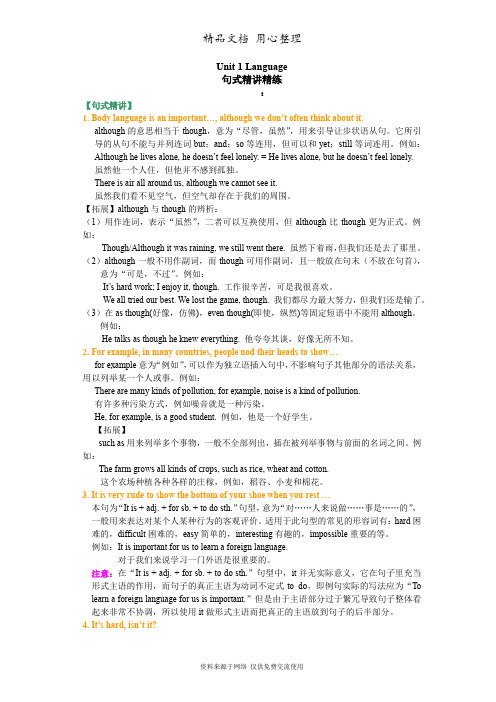
Unit 1 Language句式精讲精练:【句式精讲】1.Body language is an important…, although we don’t often think about it.although的意思相当于though,意为“尽管,虽然”,用来引导让步状语从句。
它所引导的从句不能与并列连词but;and;so等连用,但可以和yet;still等词连用。
例如:Although he lives alone, he doesn’t feel lonely.= He lives alone, but he doesn’t feel lonely.虽然他一个人住,但他并不感到孤独。
There is air all around us, although we cannot see it.虽然我们看不见空气,但空气却存在于我们的周围。
【拓展】although与though的辨析:(1)用作连词,表示“虽然”,二者可以互换使用,但although比though更为正式。
例如:Though/Although it was raining, we still went there. 虽然下着雨,但我们还是去了那里。
(2)although一般不用作副词,而though可用作副词,且一般放在句末(不放在句首),意为“可是,不过”。
例如:It’s hard work; I enjoy it, though. 工作很辛苦,可是我很喜欢。
We all tried our best. We lost the game, though. 我们都尽力最大努力,但我们还是输了。
(3)在as though(好像,仿佛),even though(即使,纵然)等固定短语中不能用although。
例如:He talks as though he knew everything. 他夸夸其谈,好像无所不知。
2.For example, in many countries, people nod their heads to show…for example意为“例如”,可以作为独立语插入句中,不影响句子其他部分的语法关系,用以列举某一个人或事。
专题12 定语从句-初中英语重要语法精讲精练(江苏专用)

专题12 定语从句定语从句关系词一、定语从句的构成This is the best film that I have seen.★先行词:被定语从句修饰的词叫先行词。
★关系词:引导定语从句的词叫关系词。
关系词又分为关系代词与关系副词关系代词:that, which, who, whom, whose关系副词:when, where, why二、关系代词作用:引导定语从句,并在从句中充当主语、宾语代指人:who,whom,that,whose代指物:that,which,whose关系词通常有下列三个作用:A、引导定语从句;B、代替先行词;C、在定语从句中担当一个成分。
1. who指人,作主语或宾语(作宾语可省略)The man who I talked with is our teacher.A person who steals things is called a thief.2. whom指人,作宾语(作宾语可省略,如介词提前则不能省)The man whom/who I nodded to is Mr. Li.The man to whom I nodded is Professor Li.3. which 指物,作主语或宾语(作宾语可省略, 如介词提前则不能省)These are the trees which were planted last year.This recorder which he is using is made in Japan.Is this the library which you borrow books from?Is this the library from which you borrow books?4. that 指人/物,作主语或宾语(作宾语可省略),且只用在限制性定语从句中。
A plane is a machine that can fly.He is the man that/who/whom I told you about.5. whose 在定从中作定语,表所属关系,翻译为“他的/她的/它的”,用来代替his,her,their,its. whose指人也指物指物时= of which 指人时= of whomThis is the book whose cover is blue.This is the book of which the cover is blue.This is the book the cover of which is blue.Do you know the girl whose father died in Iraq.Do you know the girl of whom the father died in Iraq.Do you know the girl the father of whom died in Iraq.【例题】The newly built café, the walls of_______ are painted light green, is really a peaceful place for us, especially after hard work.A. thatB. itC. whatD. which【答案】Dwho ,whom, whose, which, that口诀: 前看先行词, 辩清人或物后看从句里, 有无主宾语【练习】1).This is the house __________ was built last year.2).The boy _______________ we saw yesterday was John’s brother.3).The car __________ my uncle had just bought was destroyed in the earthquake.4).That is the man ____________ we were looking for.5).The house _____________ window are broken belongs to my grandfather.6).I hate people ______________ talk much but do little.【答案】1.which/that2.that/whom/who/ \3.that/which/ \4.who/whom/that/ \5.whose/of which the6.who/that注意点:★ 只用that 不用which 的情况★当先行词是anything, everything, nothing , none等不定代词时,或者是由every, any, all, some, no, little, few, much等修饰时等,这时的that常被省略。
专题08 连词-初中英语重要语法精讲精练(江苏专用)

专题08 连词连词的定义:用来连接词、短语或句子的词。
eg: Joan was rich, beautiful and proud. (and 连接单词)He likes to play football and sing popular songs.(and 连接短语)Go straight on and you will see the church. (and 连接句子)连词的分类并列连词连词: and, but, or, so, for 等 连词词组: either…or, neither…nor, not only…but also, both…and 等 从属连词that,whether, if, unless, while / when, until, because, so that, so…that, though/ although 等考点一:and/ but /or/ so(1)and :和;而且;又;然后①表示联合,意为“和、又、而且” 有时用于连接两个相同的词语,表示事物连续性 eg:The train ran faster and faster.①and 这样的话,就会……,相当于一个肯定条件句eg:Study hard, and you can get good grades.(If you study hard, you can get good grades.)“ and”1. He got up and left the room.2. He went to Kunming and I went Harbin last year. 并列连词从属连词连词: and, but, or, so, for 等 连词词组: either…or, neither…nor, not only…but also, both…and 等 that,whether, if, unless, while / when, until, because, so that, so…that, though/ although 等特别用法: 句型“祈使句, and …”= If you…, you will…3. Work hard, and you will do well in the exam.58(2)or:或;否则1. or 否则相当于一个否定条件句。
英语语法

语法知识精讲精练第一章冠词疑词是一个虚词,须置于名词之前,限定名词的定义,表示名词所表示的人或物。
冠词分为不定冠词(a,an)和定冠词(the)以及零冠词,(即在某些场合不使用冠词)一、不定冠词a、an的用法:1.通常在辅音或半元音前使用a,在元音前使用an。
例:a:Taylor was an 8-year-old daughter who has a gift for painting. [浙江高考题]b:Having graduated form a university, she found it hard to find an ordinary job.c:Data phone is a cellular phone that allows images, text and other visual data.2.使用在名词前表数量―—‖或表范指。
例:a:Rome was not built in a day.b:If you grow up in a large family, you are more likely to develop the ability to get on well with others.注:此时a与one的区别:1、more than a / an more than one例:It’ll take me more than an hour to finish the work.这项工作我要用一个多小时完成。
(不超过两小时)It’ll take me mo re than one hour to finish the work.这项工作不是我一个小时能完成的。
(要两个小时甚至更多的时间)3.表示―一个……另一个…‖之意时用而不用例:O ne man’s meat is another man’s position人各有志。
另:在下列情况下,a,one可以互换:例:in a/one word简而言之,a/one hundred percent百分之百,十足4.、表类别:Generally speaking an adult runs faster than a child.一般来说,成年人比小孩距得块。
Unit9词句精讲+提高巩固-七年级英语下册词句精讲精练(人教版)

Unit 9 What does he look like?【词汇精讲】1. build(1)build作名词意为“体格,体型”。
例如:a man of strong build 一个体格健壮的人(2)build 作动词意为“建造,建设,建立”。
例如:We are building a house.我们正在建造一个房子。
2. a little bit , a bit&a little作状语表示“有点,一点”时,三者可以通用。
但a little bit 的程度比后两者稍弱一些。
例如:Today is a little bit/ a bit / a little hot. 今天有点热。
a bit 加上of可以和a little 一样修饰不可数名词,例如:He only has a little / a bit of money. 他只有一点钱。
3. shortshort 作形容词,意为“短的,矮的”。
(1)short 作“短的”讲时,可以指距离、时间、物体的“短”,反义词是long(长的)。
例如:This pencil is short, but that one is long. 这支铅笔短,但是那支长。
(2)short 作“矮的”讲时,可以指人的个子矮,反义词是tall(高的)。
例如:He is a short man. 他是一个身材矮小的人。
4. straight(1)straight 作形容词,意为“直的”,可用来形容头发,也可用来形容其他事物,在句子中可以作定语也可以做表语。
例如:a straight line 一条直线She has long straight hair. 她长着长长的直发。
(2)straight 还可以作副词,意为“直地,直接地”,常在动词短语后修饰动词。
例如:Let’s go straight home. 让我们直接回家。
Sit up straight, please. 请坐直。
北师大版初中英语九年级下册Unit 7 Journey 句式精讲
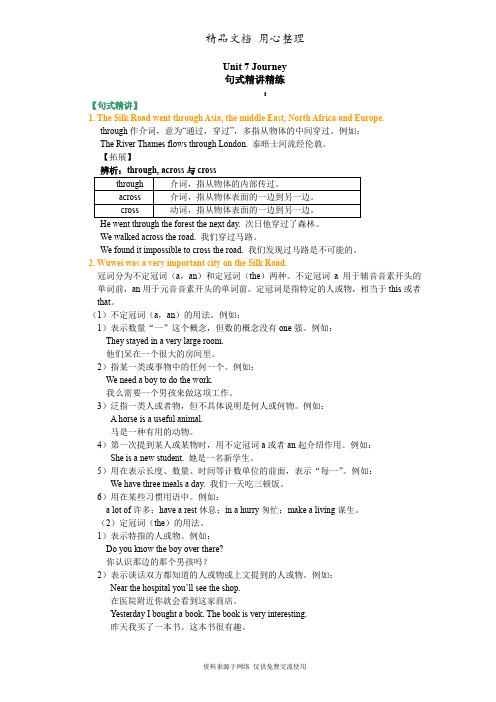
Unit 7 Journey句式精讲精练:【句式精讲】1. The Silk Road went through Asia, the middle East, North Africa and Europe.through作介词,意为“通过,穿过”,多指从物体的中间穿过。
例如:The River Thames flows through London. 泰晤士河流经伦敦。
【拓展】辨析:through, across与crossHe went through the forest the next day. 次日他穿过了森林。
We walked across the road. 我们穿过马路。
We found it impossible to cross the road. 我们发现过马路是不可能的。
2. Wuwei was a very important city on the Silk Road.冠词分为不定冠词(a,an)和定冠词(the)两种。
不定冠词a 用于辅音音素开头的单词前,an用于元音音素开头的单词前。
定冠词是指特定的人或物,相当于this或者that。
(1)不定冠词(a,an)的用法。
例如:1)表示数量“一”这个概念,但数的概念没有one强。
例如:They stayed in a very large room.他们呆在一个很大的房间里。
2)指某一类或事物中的任何一个。
例如:We need a boy to do the work.我么需要一个男孩来做这项工作。
3)泛指一类人或者物,但不具体说明是何人或何物。
例如:A horse is a useful animal.马是一种有用的动物。
4)第一次提到某人或某物时,用不定冠词a或者an起介绍作用。
例如:She is a new student. 她是一名新学生。
5)用在表示长度、数量、时间等计数单位的前面,表示“每一”。
例如:We have three meals a day. 我们一天吃三顿饭。
仁爱版初中英语7下Unit 5 Our School Life 词句精讲精练

Unit 5 Our School Life精讲精练词汇精讲1. alwaysalways是频度副词,意为“一直,总是”。
它的反义词是never, 意为“从不”。
常用于一般现在时,其划线提问要用How often +一般疑问句。
例如:She always likes birthday cards. 她总是喜欢生日贺卡。
【拓展】always, usually, often, sometimes和never是英语中最常见的频度副词。
(1)always的频度约为100%,表示动作重复、状态继续,中间没有间断,意为“总是、永远地”。
例如:The sun always rises in the east and sets in the west. 太阳总是东升西落。
(2)usually的频度为约80%左右,意为“通常、平常”,即很少有例外。
例如:He usually goes to bed at ten o’clock. 他通常十点钟睡觉。
(3)often的频度为约60%左右,意为“常常”,但不如usually那么频繁,表示动作重复,中间有间断。
例如:He is often late for school. 他上学经常迟到。
(4)sometimes的频度约为40%左右,意为“有时”,表示动作偶尔发生。
可以位于句首,以示强调。
例如:It is sometimes hot and sometimes cold. 天气忽冷忽热。
Sometimes he does it this way and sometimes he does it that way.他有时这样做,有时那样做。
(5)seldom的频度约为20%左右,意为“很少、不经常”。
例如:I hardly ever go out these days. 这些天我几乎不出门。
(6)never 的频度为0,意为“从来不、永不”。
例如:My parents are never late for work. 我父母上班从来不迟到。
- 1、下载文档前请自行甄别文档内容的完整性,平台不提供额外的编辑、内容补充、找答案等附加服务。
- 2、"仅部分预览"的文档,不可在线预览部分如存在完整性等问题,可反馈申请退款(可完整预览的文档不适用该条件!)。
- 3、如文档侵犯您的权益,请联系客服反馈,我们会尽快为您处理(人工客服工作时间:9:00-18:30)。
单元语法知识精讲
一、如何询问价格
询问价格的句型为:How much is/are …?
1.“How much is …?”常用来询问单数名词或不可数名词的价格,对此问句进行回答时常用句型为:“It’s+价格”。
eg:
—How much is the T-shirt?这件T-恤衫多少钱?
—It’s 68 yuan.68元。
—How much is the milk?牛奶多少钱?
—It’s 109 yuan.109元。
2.“How much are …?”常用来询问复数名词的价格,对此问句进行回答时常用句型为:“They’re+价格”。
eg: —How much are these shoes?这双鞋子多少钱?
—They are 18 dollars.18美元。
—How much are those dresses?那些连衣裙多少钱?
—They’re 80 yuan.80元。
【拓展】
询问物品的价格还可以用句型“What’s the price of …?”。
使用这一句型时,不管所询问的物品是单数还是复数,be动词都用is,其答语都用“It’s …”。
eg: —What’s the pr ice of that book?那本书多少钱?
—It’s fifteen yuan.15元。
—What’s the price of the books?那些书多少钱?
—It’s fifty yuan.50元。
二、基数词的记忆规则及用法
1.基数词的记忆规则
(1)0—12这13个数字独立成词,要单独记忆。
它们分别是:zero,one,two,three,four,five,six,seven,eight,nine,ten,eleven, twelve。
(2)13—19都是以“个位数+teen”构成,fourteen,sixteen,seventeen,nineteen为个位数直接加-teen 构成;thirteen,fifteen,eighteen的拼写需特殊记忆。
(3)20—90整十位数的基数词由相应的个位数字后加-ty构成。
sixty,seventy,ninety为个位数直接加-ty构成;twenty,thirty,forty,fifty,eighty的拼写需特殊记忆。
(4)21—99的两位数的表达是整十位数加个位数,中间加上连字符“-”。
eg:
twenty-one,forty-two,seventy-eight
(5)100可以写成a hundred或one hundred。
一般hundred都不用复数形式。
eg:
two hundred,three hundred
2.基数词的用法
(1)表示年龄,基数词放在years old之前。
eg:
He is twelve years old.他十二岁。
(2)用来表示人或物的数量,放在名词之前。
eg:
I have three balls.我有三个球。
(3)表示顺序、编号等,放在名词之后。
eg:
I’m in Class Four.我在四班。
(4)用来计算。
eg:
Two and six is eight.二加六等于八。
—What’s forty and twenty?40加20等于多少?
—It’s sixty.等于60。
(5)基数词作主语时,谓语动词用单数形式。
eg: Six and ninety is ninety-six.6加90等于96。
单元语法强化训练
Ⅰ.用be动词的适当形式填空。
1.How much_________ (be)this white bag?
2.How much _________(be)those blue shorts?
3.How much__________ (be)the bread?
4.Eighteen and twelve __________(be)thirty.
5.Nine hundred __________(be)enough(足够的).
Ⅱ.句型转换,每空一词。
1.These socks are two dollars.(对画线部分提问)
______ _______ _______these socks?
2.How much is the rice?(改为同义句)
_______ _______ ______ ______the rice?
3.Sixty-two and thirty-eight is one hundred.(对画线部分提问)
_______ _______sixty-two and thirty-eight?
4.John’s sister is eight years old.(对画线部分提问)
______ ______ ______John’s sister?
5.What’s the price of these trousers?(改为同义句)______ ______ ________these trousers? Ⅲ.根据汉语意思完成句子,每空一词。
1.—那件蓝色的夹克衫多少钱?
—98元。
— _____ ______ ______that blue jacket? — _______98 yuan.
2.琳琳的妈妈39岁。
Lingling’s mother is______ _______ ______.
3.他需要19个篮球。
He needs______ _______.
4.迈克在8班。
Mike is in _______ _______ .
5.—这双白色的鞋子多少钱?
—88元。
—How much _________ these white shoes? — ________88 yuan.
单元语法强化训练
Ⅰ.1.is2.are3.is4.is5.is
Ⅱ.1.How much are2.What’s the price of3.What is4.How old is5.How much are Ⅲ.1.How much is;It’s2.thirty-nine/39 years old
3.nineteen/19 basketballs
4.Class Eight
5.are;They’re。
